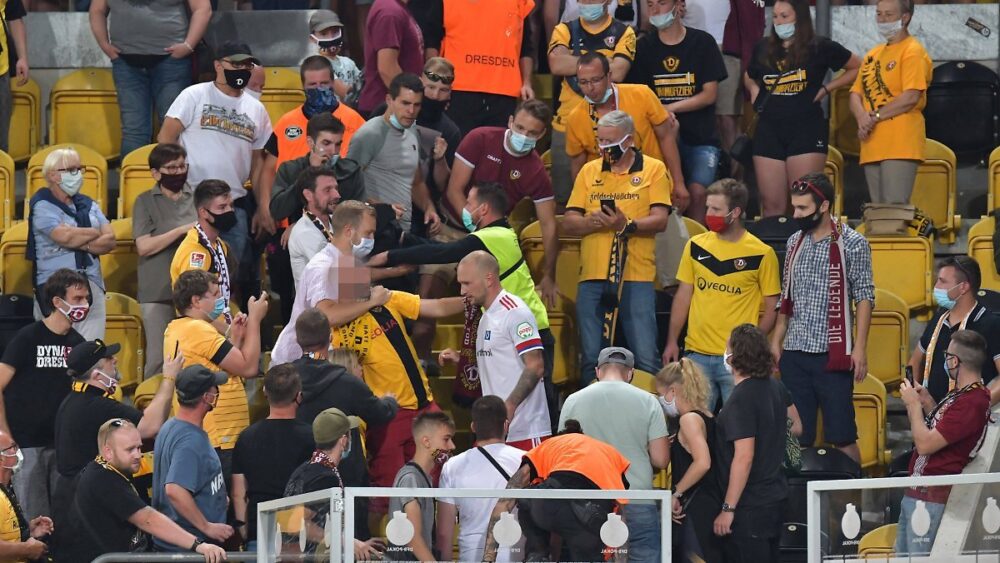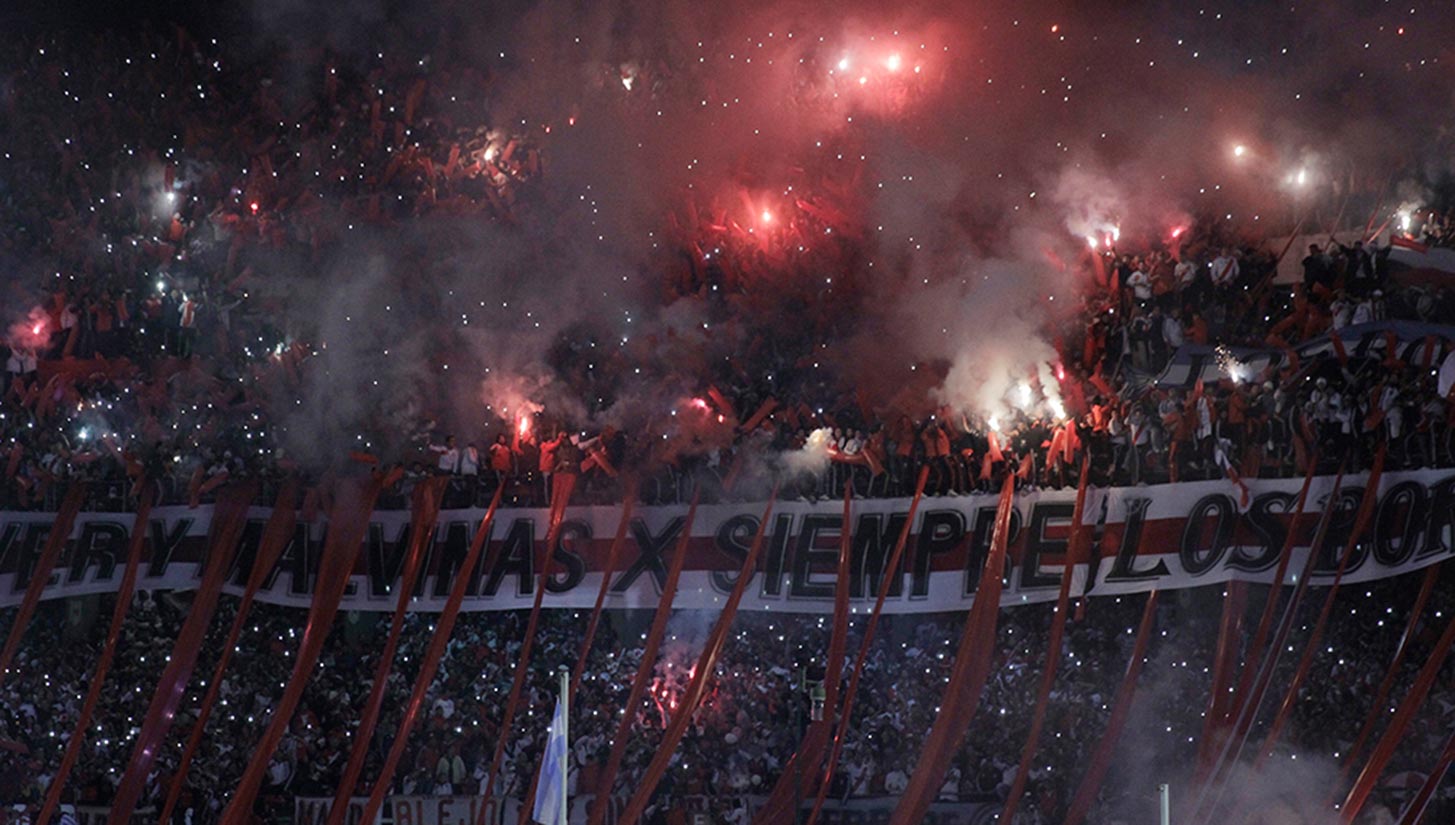Last week, Hamburg defender Toni Leistner made headlines after he confronted fans who allegedly hurled insults towards his wife and daughter. In the wake of the brouhaha, we debate the age old question: Should fans be able to say whatever they want from the stands?
In early 2018, Fox News’ Laura Ingraham told LeBron James and Kevin Durant to “shut up and dribble.” This of course led to a storm of backlash and debate, even sparking a three-part SHOWTIME series that explored the role and influence of Black athletes and shared a title with the now infamous four-word phrase.
Later that same year, Durant confronted a trash talking fan with a similar utterance, “Watch the game and shut up.” (Although his version had a few more expletives.)
The latter incident is one of many between athletes and oft-inebriated fans who let their mouths get the best of them. Like Ingraham’s comments, it added fuel to a long-running debate — not about whether athletes should be vocal about politics, but rather what rights do fans have while heckling opposing teams and players?
Toni Leistner climbed into the stands to confront a fan! 👀 pic.twitter.com/7cpkkq17Tr
— Football Daily (@footballdaily) September 15, 2020
Player-fan clashes are perhaps more common in basketball, but that doesn’t mean football is immune to them. Just last week, Hamburg defender Toni Leistner went into the stands to physically confront a group of fans who he said were disrespecting his wife and daughter.
In 1995, the legendary Eric Cantona infamously kicked a Crystal Palace fan after being sent off. And while they aren’t physical confrontations, we’d be remiss to omit the vast amounts of racist chants and demonstrations perpetrated by fans from all over the world.
So what do fans have the right to say, and where should the line be drawn? Our very own Kevin Vote and Jeremy Rist argue both sides — you make the decision yourself.
Pro-Players
Argued by: Kevin Vote

Professional athletes deal with some of the most stressful, scrutinized situations in the world whenever they step onto a court or field. While top athletes are paid millions of dollars to essentially play a game, it’s still one of the most difficult jobs out there, requiring immense concentration. Nothing can discount that. And when you add raucous fans heckling them while they’re trying to execute at a high level, things can get testy or even downright out of control quickly.
But who can blame the players really? Imagine if somebody came to your cubicle to watch you work and started insulting your family or making vile comments about that time you made a fool of yourself at the office Christmas party. (That was two years ago!)
Obviously, athletes are used to a certain amount of heckling when playing games. That’s called home court or home field advantage. Sometimes heckling can even take on a funny tone, as portrayed in the classic Happy Gilmore, where movie villain Shooter McGavin pays someone to follow Happy around the golf course and heckle him after every bad shot.
However, there’s a clear line which spectators are expected to adhere to. It’s like a social contract. After all, athletes are human beings too. Just because people pay to attend a sporting event, that doesn’t give them carte blanche to savagely rip into the performers who they paid to watch.
Yes, technically the first amendment gives you the right to free speech, but athletes also have the right to kick your ass if you pole vault over the line into hate speech or personal attacks beyond what’s socially acceptable. Just ask Ron Artest. Or Russell Westbrook. Or Eric Dier. Or more recently, Hamburg defender Toni Leistner.
Nearly all sporting events have fan conduct notices prior to the game warning spectators that any people engaging in harmful or abusive language towards other spectators, players, or officials will be subject to removal. It’s time we as a society actually live up to the second half of that statement.
If we’re removing fans for picking fights with other fans, which is sadly often the case these days, we should start removing fans who pick fights with players. Actually enforcing the fan conduct policy would greatly minimize all the player-fan altercations we’re seeing.
While fans aren’t always at fault in these situations, it’s safe to say most of the time they are. Athletes shouldn’t always be given the benefit of the doubt, however full investigations should be conducted to get to the bottom of things when the cause is unclear.
Perhaps enforcing long term or lifetime bans on the fans involved and giving hefty fines to athletes who enter the stands would finally put an end to player-fan altercations. Or, you know, just some basic human decency on behalf of the fans who instigate these needless confrontations.
Pro-Fans
Argued by: Jeremy Rist

Fans should be able to say whatever they want to players without fear of violent retaliation. If they take offense to or don’t like what’s being said, hopefully it throws them off their game and helps your team win.
Obviously, it goes without saying that any racist or sexist or any other “-ist” comments do not fall under this umbrella. There are limitations to free speech and that’s on society to police, but if we’re talking about comments that won’t get you kicked out of the arena or in serious legal trouble — we should have free rein. As long as we keep it under this umbrella, athletes have no right to come up into the stands and confront us. That is never acceptable in any universe or equation.
After all, we have to remember that athletes are paid for their athleticism — which translates directly to their ability to control their bodies, and in turn, their minds. They need to operate in high pressure scenarios and use their heads to be able to do so. If they aren’t able to do that, it’s their fault. It’s on them to make plays that lead to their or their teams’ victories.
There are those who’d argue, “Well you’d never say anything like that to an athlete on the street.” Exactly. The stands are probably the only place where I can talk shit to someone who could unequivocally kick my ass. You best believe I’m cashing in on that opportunity as much as possible.
Fans can impact a game and tip the scales to help their team win. They should try to give their team all the encouragement and enthusiasm possible to allow them to dig that extra bit deeper so they can pull out a victory. Conversely, they should also try to heckle and harass the other team to make them play worse. Sports are about the margins, the edges, the little areas where you can make a big difference. “A game of inches” has become cliche for a reason. Wild fans and atmospheres are a part of that.

You can be too cool and browse Instagram instead of cheering because you don’t want to be seen contributing to something that’s bigger than you — that’s your choice. But if a whole crowd chooses to do that, you have a lame building and a nonexistent home field advantage. If the crowd is sitting around waiting to be impressed before they cheer instead of roaring and celebrating regardless, then they might be too stuck up to enjoy the event anyway, and they should’ve given their seat to someone who knows how to have a good time instead.
But for the people who want to get involved, who want to try to make an impact — they should scream and clap and jeer all they can to help their team win. Save all that strictly positive cheering for AYSO. These are the big leagues, and nice guys finish last.








